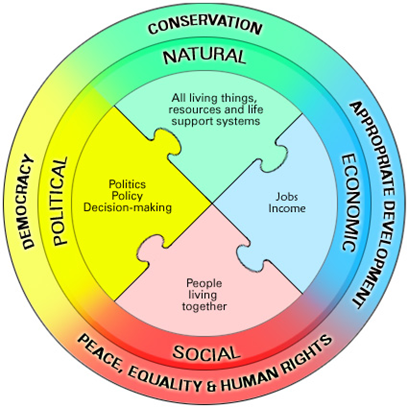Education needs to be founded on a holistic, inclusive conception of human activity and its relationship to the physical and biological environment.
Education should impart a comprehensive and inclusive perspective of our planet and human society as a self-organizing, self-regulating, open, living organic system. Education should promote holistic, synthetic, integrated thinking and action required for equitable and sustainable peace and prosperity in the 21st century.

Our traditional educational system treats reality as a set of separate, autonomous fields of study, whereas the fundamental truth of our existence is that everything is related with and interacting with everything else. Peace, democracy, prosperity, education, human rights and human welfare are interdependent. So too, the welfare of humanity and the health of our biosphere are inextricably interlinked. Financial instability and unemployment, water supply and food security, economic growth and social equity, technology and human welfare, industrialization and pollution, energy consumption and ecology, nuclear energy and human security, competition for scarce natural resources and prosperity for all, peace and human rights are interrelated challenges which require integrated solutions. Education needs to be founded on a holistic, inclusive conception of human activity and its relationship to the physical and biological environment. Earth’s problems are our problems.
Education for Sustainability
- “Educating for a sustainable future is not so much about a destination as about the process of learning to make decisions that consider the long-term economy, ecology and equity of all communities. Its goal is to build an enduring society. This involves learning how to anticipate the consequences of our actions, envision a sustainable future and create the steps needed to achieve the vision. Individuals and societies will perpetually have to make choices. How those choices are made and the information and ethical discernment used in making them will determine whether our visions of a sustainable future are achieved.”
- Solving environmental problems and preventing new ones from arising will require an understanding and appreciation of the linkages between environmental well-being and human well-being. However, many of these linkages are not apparent at the first instance. This is where education is crucial. To bring environment and development concerns to people’s notice, to enable them to understand the linkages between the two, to encourage them to take appropriate action, and to equip them with the skills necessary for taking the required action – education is necessary for all this.
- Provide children and adults with the cultural background that will enable them, as far as possible, to make sense of the changes taking place. This presupposes that they are capable of sorting the mass of information so as to interpret it more effectively and place events in a historical perspective.
- Value based education: Help the students learn that a sustainable future is one in which they value social justice and peace, protect natural systems and use resources wisely, make decisions through fair and democratic means and develop the capacity and commitment to apply these principles at the level of personal and family actions, and in decisions for local, national and global communities.
- Experiential learning, Values education, Enquiry learning, Appropriate assessment, Future Problem Solving, Learning outside the classroom, Community Problem Solving are some of the ways in which teachers can help students achieve the wide range of knowledge, skill and values needed for sustainability education.
- Students can be encouraged to understand the interconnectedness of life and the problems of the planet using an interdisciplinary approach.
New Ways of Thinking
- The growing environmental awareness marks the birth of a new and more integral way of understanding ourselves and the world around us.
- The emergence of systems thinking and complexity science reflects profound truths of existence that defy representation by purely analytic reductionist forms of knowledge.
- The traditional perspective of the physical sciences is an insufficient model for the biological and social sciences. In the words of Robert Rosen, “contemporary physics does not yet provide enough to allow the problems of life to be well-posed.”
- As Chaos theory tells us, in the living world small changes can have immense repercussions, i.e. the Butterfly Effect. Non-linearity is the mathematics of living systems.
- As Fritjof Capra argues, the reductionist, mechanistic Cartesian view of the universe governed by universal laws is giving way to the perception of a self-organizing web of life.
Further Reading
- Fritjof Capra, The Hidden Connections (London: Harper Collins, 2002)
- Learning: The Treasure Within (UNESCO: Geneva, 2001)
- Robert Rosen, Life Itself (New York: Columbia University Press, 2000)
- “Towards a Sustainable Future” Teaching and Learning for a Sustainable Future UNESCO
